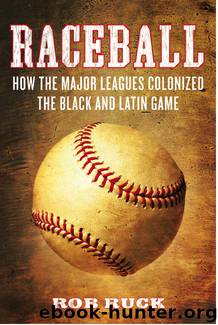Raceball: How the Major Leagues Colonized the Black and Latin Game by Rob Ruck

Author:Rob Ruck [Ruck, Rob]
Language: eng
Format: epub
Tags: Library, History, Baseball, General, United States, Social Science, Ethnic Studies, Sociology, United States - Social Conditions, Baseball - Social Aspects - United States, Minority Studies, African American Baseball Players, Latin America - Social Conditions, Social Aspects, Baseball - United States - History, Major League Baseball (Organization) - History, Discrimination in Sports, Caribbean Area - Social Conditions, Discrimination in Sports - United States - History, Hispanic American Baseball Players, Discrimination & Race Relations
ISBN: 9780807048054
Publisher: Beacon Press
Published: 2011-03-01T00:00:00+00:00
Reggie Jackson (National Baseball Hall of Fame Library, Cooperstown, NY). Reginald Martinez “Reggie” Jackson, whose father played in the Negro Leagues, was one of baseball’s greatest sluggers. Never afraid to speak his mind, Jackson was on five World Series champion squads; he was nicknamed Mr. October for his performance in the postseason.
The exodus of African Americans from baseball began amid a radical makeover in sport’s political economy that wiped out much of the black community’s baseball infrastructure. After World War II, sport in the United States became ever more of a corporate affair. As television advertising, commercial sponsorships, and merchandizing pumped dizzying new revenue streams into baseball, corporate ownership prevailed. The traditional baseball families began selling out; by 1977, only the Griffiths in Minnesota and the O’Malleys in Los Angeles still controlled franchises and they, too, were not long for the game.
Corporate sport overwhelmed community-based sport. Commercially driven leagues—both at the professional and collegiate level—became more powerful, while independent, community-based sport fell apart. Television had shifted the balance from playing sport to watching it. TV had also lavishly lined professional sport’s coffers by providing entertainment without directly charging those who watched, a stark departure from the days of carefully counted gate receipts.13
As television conquered most American homes during the 1950s, sport programming decimated attendance at events. Independent baseball, already thrown off its moorings by changing community patterns and suburbanization, was savaged, unable to compete. Enormous numbers of sandlot and semipro clubs disappeared. As a result, men had fewer opportunities to join the neighborhood and workplace teams that had been the mainstay of local baseball between the two world wars. Minor league baseball, meanwhile, contracted from fifty-nine to twenty-one leagues during the 1950s, and baseball’s professional workforce shrunk by several thousand roster spots.14
Most sports, whether big league or sandlot, had difficulty coping with television. After the shaving company Gillette began sponsoring fight cards on television several nights a week, boxing won a large TV audience. But fans stopped patronizing the venues that sustained local boxing, and 250 of the nation’s 300 fight clubs folded between 1952 and 1959. When the fight game bounced back up off the canvas, it did so as a televised (and increasingly cable and pay-per-view) affair. Major league baseball attendance similarly plunged after teams began televising home games, falling by a third from a 1948 high of 21 million fans at ballparks that season to 14.3 million five years later. The Cleveland Indians’ home attendance collapsed by 67 percent, while the Boston Braves’ dropped by 81 percent. National Collegiate Athletic Association football attendance fell, too, though not quite as drastically, and over seventy small colleges dropped football in the first half of the 1950s.15
Major League Baseball, the increasingly savvy NFL, and the NCAA slowly learned not just how to cope with television, but how to prosper from it. In time, their revenue streams swelled to a torrent few could have foreseen. But less commercialized levels of sport were more vulnerable. Sport in the black community was especially hard hit and the Negro Leagues, already reeling from integration, were soon extinct.
Download
This site does not store any files on its server. We only index and link to content provided by other sites. Please contact the content providers to delete copyright contents if any and email us, we'll remove relevant links or contents immediately.
| Anthropology | Archaeology |
| Philosophy | Politics & Government |
| Social Sciences | Sociology |
| Women's Studies |
Nudge - Improving Decisions about Health, Wealth, and Happiness by Thaler Sunstein(7692)
The Fire Next Time by James Baldwin(5431)
iGen by Jean M. Twenge(5408)
Adulting by Kelly Williams Brown(4565)
The Sports Rules Book by Human Kinetics(4379)
The Hacking of the American Mind by Robert H. Lustig(4375)
The Ethical Slut by Janet W. Hardy(4242)
Captivate by Vanessa Van Edwards(3838)
Mummy Knew by Lisa James(3686)
In a Sunburned Country by Bill Bryson(3537)
The Worm at the Core by Sheldon Solomon(3486)
Ants Among Elephants by Sujatha Gidla(3460)
The 48 laws of power by Robert Greene & Joost Elffers(3247)
Suicide: A Study in Sociology by Emile Durkheim(3018)
The Slow Fix: Solve Problems, Work Smarter, and Live Better In a World Addicted to Speed by Carl Honore(3007)
The Tipping Point by Malcolm Gladwell(2914)
Humans of New York by Brandon Stanton(2868)
Handbook of Forensic Sociology and Psychology by Stephen J. Morewitz & Mark L. Goldstein(2699)
The Happy Hooker by Xaviera Hollander(2686)
